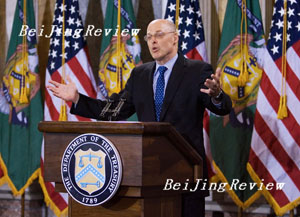|

Henry Paulson, the Bush administration's new guardian of the national coffers, won over many people during his visit to China in mid-September.
Paulson's warm reception was based around the fact that he wanted to nurture a long-term discussion of major economic issues, and not to look for "quick fixes" to curb runaway U.S. trade deficits, such as a quick revaluation of the renminbi.
From the Chinese viewpoint, an independent, manageable and gradual RMB revaluation would be the best choice.
Interviewed before the trip, the treasury secretary called China the emerging global economic engine and encouraged the country to embrace market-oriented policies. He said China had contributed half of the global growth in the past five years, together with the United States, to ease strained trade disputes.
During his visit to Beijing, Paulson and Chinese Vice Premier Wu Yi announced on September 20 that the two countries agreed to launch a strategic economic dialogue.
According to a report of the China Radio International, the agreement puts Paulson, a former head of investment bank Goldman Sachs who has extensive China experience, in charge of discussions with Beijing on the long-term challenges of a relationship that has been fraught with disputes ranging from intellectual property to the value of the RMB.
U.S. officials said Paulson, who took over Treasury in July, had persuaded cabinet colleagues and Bush that a broader economic dialogue with China was needed.
"What we've done here is to put a process in place that gives us the best chance of getting us the results that we need to get," The New York Times quoted Paulson as saying in Beijing. "To me the key thing always in working with the Chinese is to be able to get access to all the right people at the right level and have a process where there's a real discipline."
| 